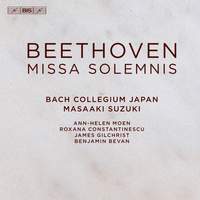Recording of the Week,
Bach from William Christie and Beethoven from Masaaki Suzuki
There’s a rather lovely symmetry to the pair of recordings dominating my Easter playlist, as two veteran early music conductors venture into new territory by tackling two of the most monumental mass-settings in the repertoire: French baroque and Handel specialist William Christie (who’s only started conducting Bach recently and has never recorded any of his major works) tackles the mighty Mass in B minor with Les Arts Florissants, whilst Masaaki Suzuki and Bach Collegium Japan follow their two-decade immersion in Bach’s music with a fiercely impressive account of Beethoven’s Missa solemnis.
 In both cases, the change in direction brings a freshness of approach coupled with insights which are evidently the result of long gestation-periods spent reading, talking and thinking about these scores, as well as little interpretative touches which bear testimony to their previous specialisms: there’s a subtle but unmistakable French accent to some of Christie’s upbeats and cadences, whilst the clarity and tautness which Suzuki and his musicians bring to Beethoven’s contrapuntal writing plays up the composer’s debt to Bach like few other performances I’ve experienced.
In both cases, the change in direction brings a freshness of approach coupled with insights which are evidently the result of long gestation-periods spent reading, talking and thinking about these scores, as well as little interpretative touches which bear testimony to their previous specialisms: there’s a subtle but unmistakable French accent to some of Christie’s upbeats and cadences, whilst the clarity and tautness which Suzuki and his musicians bring to Beethoven’s contrapuntal writing plays up the composer’s debt to Bach like few other performances I’ve experienced.
Christie’s Bach was recorded live in Paris in September 2016, just months after his first public performance of the work, and he follows the composer’s lead in flitting between the podium and keyboard (his graceful, responsive continuo-playing in the Christe eleison is a particular joy, as is the seamless blend between soprano Katherine Watson and countertenor Tim Mead). It adds to the intimate, chamber-music atmosphere of an interpretation which is refreshingly non-interventionist: the overall impression is of the music simply being given space to unfold in all its glory, and whilst the tempi are generally on the brisk side there’s nothing hard-driven or frenetic. (Christie writes in his booklet-note that he was constantly mindful of the dance impulses that underpin much of the score, which comes across as clearly in the gavotte-like Laudamus te as in the more obviously Terpsichorean Gloria. I’m not the biggest fan of the current vogue for choreographing oratorio, but Christie’s tempo choices would surely be ideal for such a project!).
All four soloists follow his lead for buoyancy and elegant simplicity, with Mead a clear first-among-equals: he’s resonant and light on his feet in the Qui sedes, and his rapt, introspective Agnus Dei is the beating heart of the work. Just occasionally Christie’s approach may be too lyrical, too purely beautiful for some tastes: the opening chorus is sung with seamless legato rather than the marcato spikiness of rival recordings, and dissonances are allowed to emerge and recede organically rather than being hammered home – though the impact of reserving such effects for a searing Crucifixus is a masterstroke. This is a reading of the work where the glories of Easter morning are constantly in sight, even in the darkest moments of the score.
 Suzuki’s Missa solemnis, in contrast, is as dramatic as they come: despite the relatively small instrumental and choral forces (just over thirty singers and four desks of first and second violins), the momentum never slacks, and the energy is relentless in the best possible way. As with Christie, speeds tend towards the brisk, and the mammoth choral fugue on Et vitam venturi is dispatched with a thrilling sense that the wheels are about to spin off at any moment (they don’t – Suzuki’s singers are too well-versed in Bach to have anything to fear from Beethoven’s notoriously taxing counterpoint here). Though this is very much an historically-informed performance (using gut strings and relatively straight-toned voices), it’s also one in which the uncanny modernity of Beethoven’s writing springs to the fore: the brass chords in the Et resurrexit (shades of Florestan’s deliverance in Fidelio) can rarely have sounded so unexpected, and Suzuki’s balancing of the strange harmonies in the final stretches of the Dona nobis play up the radical nature of Beethoven’s writing for all its worth. Special mention, too, for leader Ryo Terakado’s weightless, vibrato-free solo in the Benedictus, and Thomas Holzinger’s thunderous timpani (very much to the fore on BIS’s recording). This one looks set to become a library choice for the work, and I’d put money on it following in the footsteps of Suzuki’s Mozart Mass in C minor for a Gramophone Award.
Suzuki’s Missa solemnis, in contrast, is as dramatic as they come: despite the relatively small instrumental and choral forces (just over thirty singers and four desks of first and second violins), the momentum never slacks, and the energy is relentless in the best possible way. As with Christie, speeds tend towards the brisk, and the mammoth choral fugue on Et vitam venturi is dispatched with a thrilling sense that the wheels are about to spin off at any moment (they don’t – Suzuki’s singers are too well-versed in Bach to have anything to fear from Beethoven’s notoriously taxing counterpoint here). Though this is very much an historically-informed performance (using gut strings and relatively straight-toned voices), it’s also one in which the uncanny modernity of Beethoven’s writing springs to the fore: the brass chords in the Et resurrexit (shades of Florestan’s deliverance in Fidelio) can rarely have sounded so unexpected, and Suzuki’s balancing of the strange harmonies in the final stretches of the Dona nobis play up the radical nature of Beethoven’s writing for all its worth. Special mention, too, for leader Ryo Terakado’s weightless, vibrato-free solo in the Benedictus, and Thomas Holzinger’s thunderous timpani (very much to the fore on BIS’s recording). This one looks set to become a library choice for the work, and I’d put money on it following in the footsteps of Suzuki’s Mozart Mass in C minor for a Gramophone Award.
Katherine Watson (soprano), Tim Mead (countertenor), Reinoud Van Mechelen (tenor), André Morsch (baritone), Les Arts Florissants, William Christie
Available Formats: 2 CDs, MP3, FLAC, Hi-Res FLAC
Ann-Helen Moen (soprano), Roxana Constantinescu (mezzo-soprano), James Gilchrist (tenor), Benjamin Bevan (baritone), Bach Collegium Japan, Masaaki Suzuki
Available Formats: SACD, MP3, FLAC, Hi-Res FLAC




